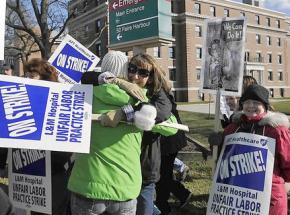On the picket line at a Connecticut hospital
reports from the picket line at Lawrence and Memorial Hospital.
SOME 800 nurses and health care technicians at Lawrence and Memorial Hospital in New London, Conn., have been walking the picket line since November 27 in their fight for a fair contract.
The workers, whose contract expired on November 16, responded to management's refusal to negotiate with a four-day strike beginning November 26--the hospital's first strike in its 101-year history and the first strike at a Connecticut hospital in 25 years. But as workers prepared to end their walkout and go back to work on November 30, management announced that the strikers would be locked out. The union has promised to keep up the picket line, and workers are picketing around the clock.
"This is a whole turning point everywhere in health care," Liz Caruso, a registered nurse who was walking the picket line with her two sons, told the Harford Courant. "They're going to water down patient care."
The main demand of nurses is to secure their jobs with a three-year contract. For some time, management has expanded hospital services to outpatient facilities that are non-union, in an explicit attempt to undercut the union. Preparing for the possibility of a strike, management had already lined up roughly 200 replacement workers to undermine the strike.

"What do we want? A contract! When do we want it? Now," chanted about 30 nurses and supporters marching in the pouring rain during the walkout. As charter bus drivers drove through the hospital entrance to pick up replacement workers, picketers chanted "Shame!" at the scabs as they got on the bus a few hundred feet away.
A rally on November 29 mobilized community support and highlighted the hospital's callousness. Continuing public support like this will be crucial in giving the nurses' struggle the resolve it needs to turn negotiations in their favor and protect their jobs.


